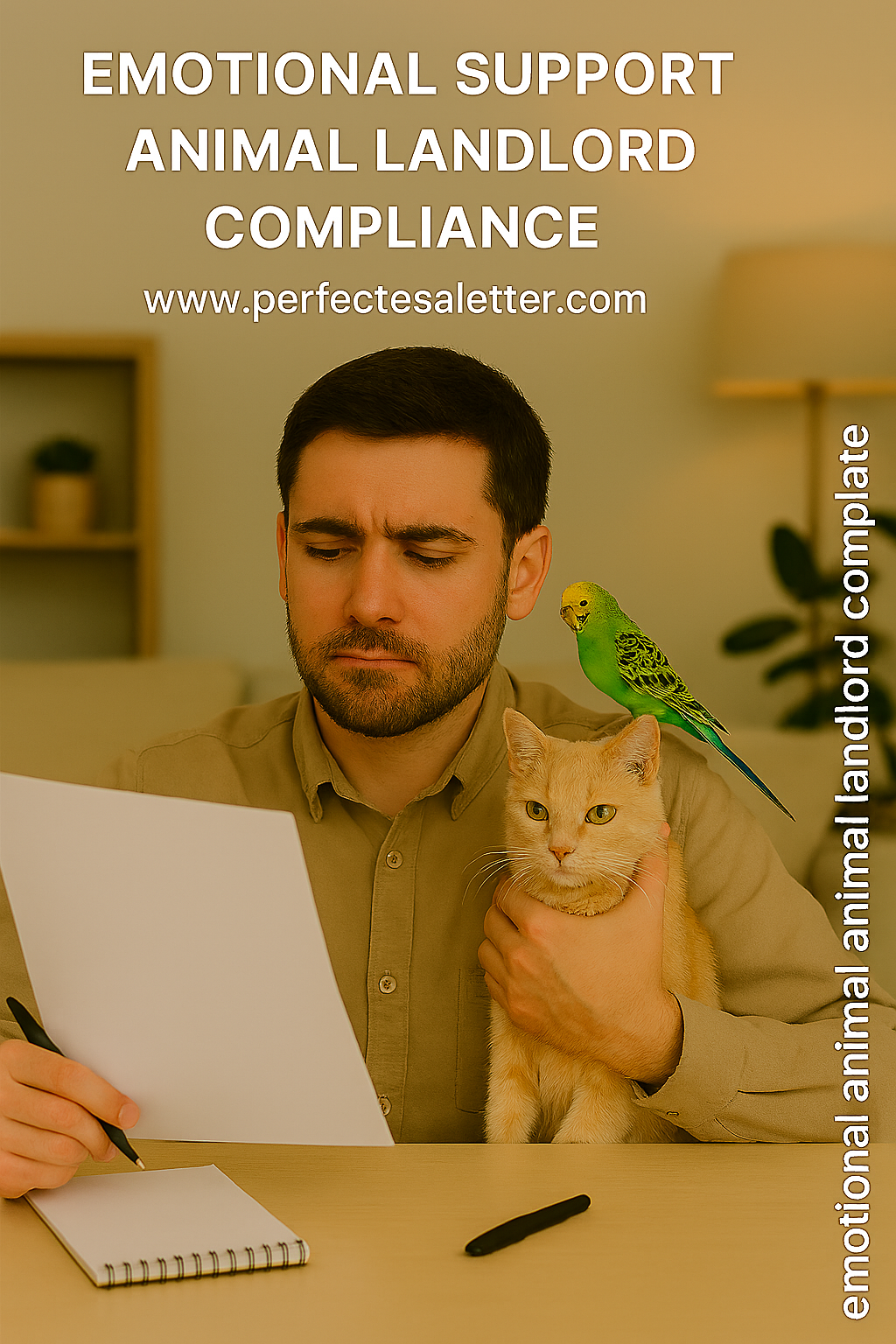Understanding Emotional Support Animal Landlord Compliance
Understanding Emotional Support Animal Landlord Compliance
Introduction
The rise of emotional support animals (ESAs) has brought important changes in the rental housing market. More tenants than ever are exercising their rights under the Fair Housing Act (FHA) to live with ESAs, even in properties with strict “no-pet” policies.
For landlords, this creates a legal obligation known as ESA compliance. Understanding the rules ensures property managers stay on the right side of the law while fostering positive tenant relationships.
This article explains:
- What ESA landlord compliance means
- The legal framework under the FHA
- Common challenges landlords face
- Best practices for compliance
- ”Get Yours Now!Don’t wait until a landlord or airline tells you “no pets allowed.” Protect your rights today.
Please fill out this form and our team wil contact you ASAP.
Complete your assessment in minutes , get approved by a licensed professional, and receive your letter within 24 hours.
What Does ESA Landlord Compliance Mean?
Simply put, ESA landlord compliance refers to a property owner’s legal duty to:
- Allow tenants with valid ESA documentation to live with their animals.
- Not charge pet fees, deposits, or higher rent for ESAs.
- Provide reasonable accommodation, even if there is a strict “no-pets” rule.
Failure to comply can lead to HUD complaints, fines, and legal disputes.
Legal Basis: The Fair Housing Act (FHA)
The FHA prohibits housing discrimination based on disability. Emotional support animals are recognized as part of disability accommodation when prescribed by a licensed mental health professional (LMHP).
Key Points for Landlords:
- No-Pet Policies: Must be waived for tenants with ESAs.
- Breed or Size Restrictions: Cannot be applied to ESAs.
- Pet Fees & Deposits: Illegal to charge for ESAs (though tenants are responsible for damages).
- Documentation: Landlords can request a legitimate ESA letter but cannot demand full medical records.
What Landlords Can Ask (and Cannot Ask)
Landlords Can Ask:
✔ Proof of ESA need in the form of a signed ESA letter.
✔ Confirmation that the letter comes from a licensed professional.
Landlords Cannot Ask:
✘ Full medical history or diagnosis details.
✘ To see the tenant’s treatment plan.
✘ Excessive verification beyond the ESA letter.
Common Landlord Concerns About ESA Compliance
- Property Damage Risks
While pet deposits cannot be charged, landlords can hold tenants accountable for damages caused by the ESA. - Other Tenants’ Allergies or Fears
These concerns may be valid but rarely justify denying ESA housing. Landlords should try to accommodate both parties reasonably. - Fraudulent ESA Letters
Landlords should be cautious of illegitimate online “certificates.” Only licensed professionals’ letters are valid.
Consequences of Non-Compliance
Landlords who deny ESA accommodation or impose illegal fees may face:
- HUD investigations
- Civil penalties and fines
- Potential lawsuits for discrimination
- Reputational damage
👉 In 2022, HUD reported thousands of ESA-related housing complaints, making it one of the most common sources of disability-related disputes.
Best Practices for ESA Landlord Compliance
- Create a Written ESA Policy
Outline procedures for tenants to submit requests, including required documentation. - Train Property Managers and Staff
Ensure everyone understands FHA compliance and tenant rights. - Verify ESA Letters Properly
Accept only letters from licensed mental health professionals (LMHPs). - Document Communication
Keep records of all ESA accommodation requests and responses. - Balance Rights with Responsibilities
Remind tenants that they are liable for their ESA’s behavior and damages.
Case Examples of ESA Landlord Compliance
- Case 1: New York Apartment Complex
A landlord initially denied an ESA request, citing a “no-pet” policy. After a HUD complaint, the landlord faced fines and was ordered to revise policies. - Case 2: Denver Rental Property
A tenant submitted a proper ESA letter. The landlord approved the ESA but reminded the tenant of responsibilities for noise and cleanliness—an excellent example of balanced compliance.
How Tenants and Landlords Can Work Together
- For Tenants: Submit requests politely and provide valid documentation.
- For Landlords: Approve requests quickly, avoid unnecessary delays, and maintain professional communication.
When both sides respect the process, ESA housing arrangements run smoothly without conflict.
Mistakes Landlords Must Avoid
❌ Denying an ESA because of “no pets” policy.
❌ Charging a “pet fee” for an ESA.
❌ Asking for private medical records.
❌ Ignoring or delaying tenant requests.
Conclusion
ESA landlord compliance is not optional—it is a legal obligation under the Fair Housing Act. Landlords must provide reasonable accommodations for tenants with valid ESA documentation, regardless of pet restrictions or personal preferences.
By establishing clear policies, verifying documentation properly, and respecting tenant rights, landlords can protect themselves from legal risks while supporting tenants who rely on ESAs for emotional well-being.
In the end, compliance not only avoids penalties but also builds a fair, inclusive housing environment for all.
”Get Yours Now!
Don’t wait until a landlord or airline tells you “no pets allowed.” Protect your rights today.
Please fill out this form and our team wil contact you ASAP.
Complete your assessment in minutes , get approved by a licensed professional, and receive your letter within 24 hours.

